The Sialendoscopes Market is estimated to be valued at USD 199.2 million in 2025 and is projected to reach USD 343.6 million by 2035, registering a compound annual growth rate (CAGR) of 5.6% over the forecast period.
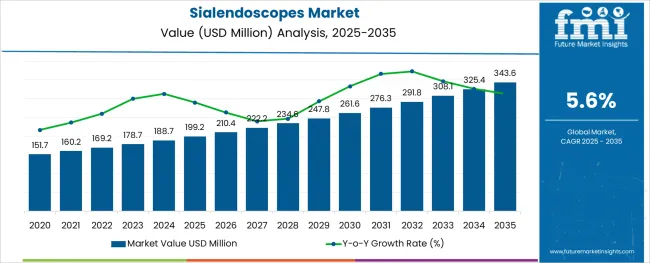
The sialendoscopes market is witnessing notable expansion due to the rising incidence of salivary gland disorders and the growing preference for minimally invasive diagnostic and therapeutic procedures. Sialendoscopy is increasingly favored over traditional surgical approaches owing to its ability to reduce patient discomfort, accelerate recovery times, and preserve gland function.
Medical institutions are expanding their otolaryngology departments with advanced visualization tools, and sialendoscopes have emerged as essential instruments for real-time ductal imaging and stone extraction. Innovations in micro-optics, irrigation systems, and accessory instrumentation have improved procedural efficiency and patient outcomes.
Clinical training programs and peer-reviewed studies are further supporting awareness and standardization of sialendoscopic techniques. With increasing procedural volumes, particularly in tertiary care centers and academic hospitals, future growth is expected to be fueled by product miniaturization, integrated imaging platforms, and greater accessibility of ENT diagnostics in emerging healthcare markets.
The market is segmented by Type and End User and region. By Type, the market is divided into Flexible Sialendoscopes and Rigid Sialendoscopes. In terms of End User, the market is classified into Hospitals, Specialty Clinics, and Others. Regionally, the market is classified into North America, Latin America, Western Europe, Eastern Europe, Balkan & Baltic Countries, Russia & Belarus, Central Asia, East Asia, South Asia & Pacific, and the Middle East & Africa.
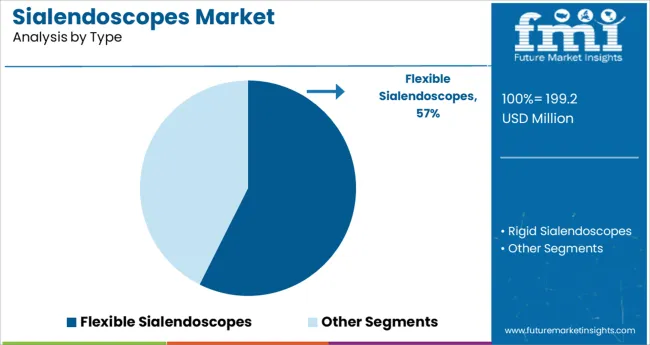
Flexible sialendoscopes are anticipated to hold 57.4% of the total revenue share in 2025, establishing them as the leading device type in the market. Their dominance is driven by their superior maneuverability, which enables navigation through tortuous salivary ducts with minimal trauma.
These instruments provide enhanced visualization and access to deeper glandular structures, supporting both diagnostic and interventional applications in a single session. Flexible sialendoscopes have gained strong acceptance among ENT specialists due to their adaptability across a range of anatomical presentations and their ability to accommodate working channels for stone retrieval, biopsy, and duct dilation.
Their role in reducing the need for gland excision and improving procedural success rates has contributed to their growing utilization. Additionally, continued improvements in scope durability and optical clarity are further reinforcing their status as the preferred choice in clinical practice.
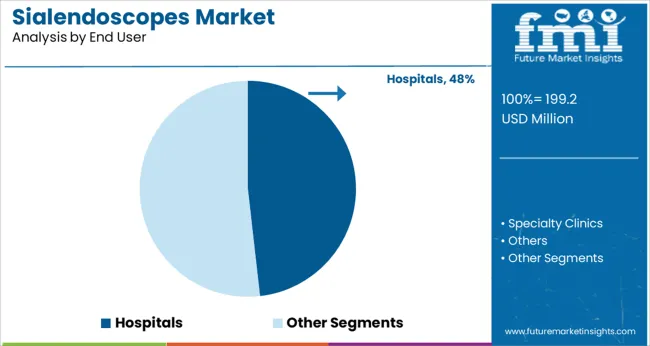
Hospitals are projected to account for 48.2% of the total market revenue in 2025, positioning them as the leading end user category for sialendoscopes. This dominance is being driven by the high concentration of ENT specialists, availability of surgical infrastructure, and growing patient inflow for salivary gland procedures within hospital settings.
Hospitals are often equipped with the required imaging systems, sterile environments, and post-procedure care facilities that align with sialendoscopy protocols. Institutional investments in modernizing ENT departments and expanding outpatient surgical capacities have led to increased procurement of advanced endoscopy systems, including sialendoscopes.
Moreover, hospitals play a pivotal role in training and education, further supporting the integration of sialendoscopic techniques into standard care practices. As procedural volumes increase and interdisciplinary care models evolve, hospitals are expected to maintain their leadership position in adopting and utilizing sialendoscopy equipment.
What are the Key Drivers Propelling Growth of the Sialendoscopes Market?
Flexible sigmoidoscopy procedures allow doctors to check for salivary gland diseases, infection, swelling, and others more easily than other traditional devices. Moreover, the sial endoscopes market share is strengthening as this wire direct enables the doctor to pick up and keep up ductal access all through the procedure and augments proficiency.
Sialendoscopy is a minimally invasive procedure that allows the establishment of a solid diagnosis of most pathologies like sialolithiasis with stone baskets, and micro burrs. Endoscopic treatment by sial endoscopes offers a minimally invasive alternative to open salivary gland surgery with integrated injection and working channels. There are other a few reasons that might be suggested for the strengthening of the sial endoscopes market future trends, with a standout amongst the most widely recognized reasons being the need to screen for sialolithiasis and salivary duct diseases.
The procedures related to Sialendoscopy can be without surgery or anesthesia, even in children. It also helps in treating salivary gland tumors without disfiguring and nerve injury which is anticipated to drive the sial endoscopes market share in the coming days.
Notwithstanding, the cost of the endoscopy procedure and the lack of medical healthcare professionals or experts in developing nations is expected to hamper the sial endoscope market growth over the conjecture time frame. Uncertainty by the government regulations, reimbursement coverage, and accuracy or technology infancy is also a concern for the adoption of sial endoscopes to a certain extent.
Is the Sialendoscopes Market Returning to Normalcy in Current Times?
While the global sial endoscopes market was doing fairly with a growth rate of 4.9% during the period coverings the years 2020 to 2024, the outbreak of the Covid-19 pandemic briefly halted the development. The Sialendoscopes market survey report offers three market recovery scenarios as businesses reorganize their resources to sustain after the pandemic's constraints. Disruptions to the supply chain, customer confidence, economic effect, and general industry recovery considerations are taken into account for this new research report on sial endoscopes market adoption trends.
However, significant growth can be expected during the forecast period, which is likely to put the market on track with advancements.
Which is the Best Performing Segment for the Sialendoscopes Market?
Flexible sial endoscopes are the best-performing market segment and dominate the global sial endoscope market size. Though rigid sial endoscopes have found some new applications with the discovery of new diagnostic methods, their contribution to the sial endoscopes market growth has remained minimal over the years.
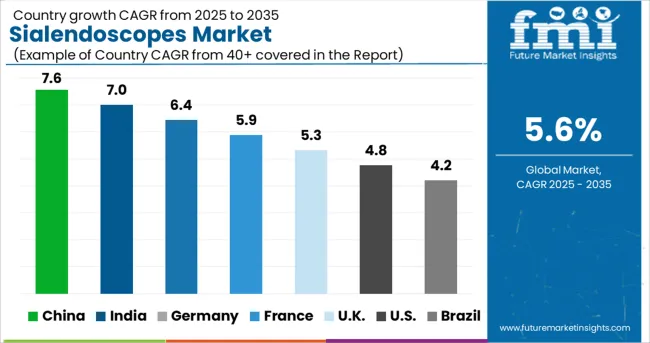
The FMI sial endoscopes market analysis report suggests the USA and Canada together contribute nearly 37.4% to the overall market.
North America is the largest shareholder in the global sial endoscopes market in terms of revenue generated every year. By virtue of its robust healthcare infrastructure in the region, the sales of sial endoscopes have remained very high in comparison to other geographical regions.
As evident from the sial endoscope market statistics, the Asia Pacific economies together contribute to almost 29.2% of the global market.
Asian countries (mainly China and India) are having more growth opportunities for market players in the forecast period. In Asia Pacific regions, medical device industries are starting to make partnerships, now improving the efficiency of the healthcare delivery system as well as the workforce in other sectors too.
Western Europe region has a huge market owing to a large number of manufacturers, technological advancements with an increasingly aging population, and growing brand awareness about the upcoming devices and technology.
The healthcare devices market is heightening by 15-20% per year. The global market for sial endoscopes is expanding as a result of ongoing invention. Start-ups are launching new revolutionary medical devices designed to improve patient outcomes and shorten hospital stays.
Newly launched sial endoscopes are now forming a demanding market by minimizing future expenses and by neglecting unnecessary hospitalizations. Most Sialendoscopes firms that come up in the post-pandemic environment are operating with haste and consumer focus. They are also attempting to reduce costs along different links in the value chain so that items can be sold for a profit.
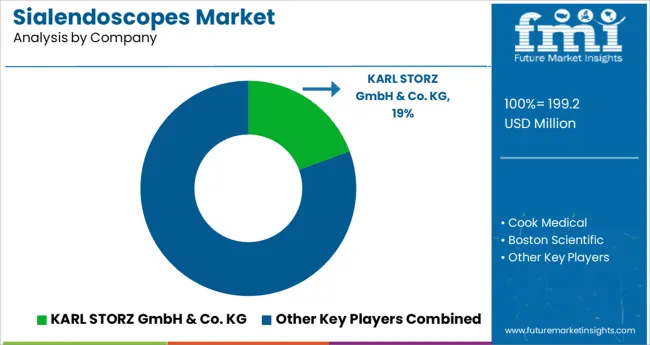
Globally, the manufacturers of sial endoscopes have implemented the strategies such as merger and acquisition, and technology advancements such as the use of the latest design and technology. Additionally, in the long run, production modernization and expansion together with ongoing innovation and customer-focused initiatives will continue to be crucial success drivers for the sial endoscopes market key players.
| Attributes | Details |
|---|---|
| Growth Rate | CAGR of 5.6% from 2025 to 2035. |
| The base year for Estimation | 2025 |
| Historical Data Available for | 2020 to 2024 |
| Forecast Period | 2025 to 2035 |
| Quantitative Units | Revenue in million and CAGR from 2025 to 2035 |
| Report Coverage | Revenue Forecast, Volume Forecast, Company Ranking, Competitive Landscape, Growth Factors, Trends, and Pricing Analysis. |
| Segments Covered | Type, End User, Region |
| Regions Covered | North America; Latin America; Asia Pacific; Japan; Western Europe; Eastern Europe; Middle East & Africa |
| Key Countries Profiled | United States of America, Canada, Brazil, Argentina, Germany, United Kingdom, France, Spain, Italy, Nordics, BENELUX, Australia & New Zealand, China, India, GCC Countries, South Africa |
| Key Companies Profiled | KARL STORZ GmbH & Co. KG; Cook Medical; Others |
| Customization | Available upon Request |
The global sialendoscopes market is estimated to be valued at USD 199.2 million in 2025.
It is projected to reach USD 343.6 million by 2035.
The market is expected to grow at a 5.6% CAGR between 2025 and 2035.
The key product types are flexible sialendoscopes and rigid sialendoscopes.
hospitals segment is expected to dominate with a 48.2% industry share in 2025.






Full Research Suite comprises of:
Market outlook & trends analysis
Interviews & case studies
Strategic recommendations
Vendor profiles & capabilities analysis
5-year forecasts
8 regions and 60+ country-level data splits
Market segment data splits
12 months of continuous data updates
DELIVERED AS:
PDF EXCEL ONLINE

Thank you!
You will receive an email from our Business Development Manager. Please be sure to check your SPAM/JUNK folder too.
Chat With
MaRIA